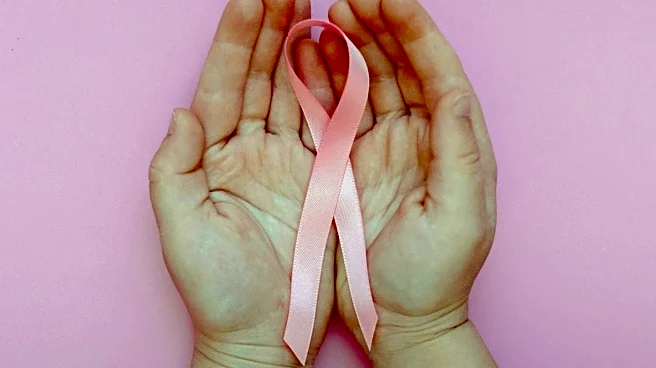What's Happening?
Arab women across the Middle East have united in a campaign to fight breast cancer, marking Breast Cancer Awareness Month with pink scarves and hijabs. The initiative spans countries like Lebanon, Syria,
Jordan, Saudi Arabia, and Yemen, promoting early detection and awareness amid rising mortality rates. In Lebanon, Health Minister Rakan Nassar al-Din launched a campaign offering free mammograms, while Syria emphasized early screening despite medicine shortages due to sanctions. Jordan's Princess Ghida Talal led a national campaign encouraging women to overcome fear and get screened. The movement symbolizes hope and defiance in the face of regional challenges.
Why It's Important?
The breast cancer awareness campaign highlights the critical need for early detection and prevention in the Arab world, where cancer rates are rising. By offering free mammograms and promoting awareness, these initiatives aim to reduce mortality rates and improve health outcomes for women. The campaign also fosters unity across nations facing political and economic challenges, demonstrating the power of collective action in addressing public health issues. As awareness grows, it may lead to increased funding and support for cancer research and treatment in the region.
What's Next?
The ongoing campaign is expected to continue raising awareness and encouraging women to seek early detection and treatment. As more women participate in screenings, healthcare systems in the region may need to adapt to increased demand for services. Additionally, the campaign could inspire further collaboration among countries to address broader health challenges and improve access to medical care. Continued advocacy and education efforts will be crucial in sustaining momentum and achieving long-term health improvements.
Beyond the Headlines
The campaign underscores the importance of addressing healthcare disparities and access issues in the Middle East. While initiatives like free mammograms are beneficial, they highlight the need for comprehensive healthcare reforms to ensure all women have access to necessary medical services. The movement also raises cultural considerations, as it navigates traditional norms and encourages women to prioritize their health. Long-term, the campaign may contribute to shifting societal attitudes towards women's health and empowerment.









